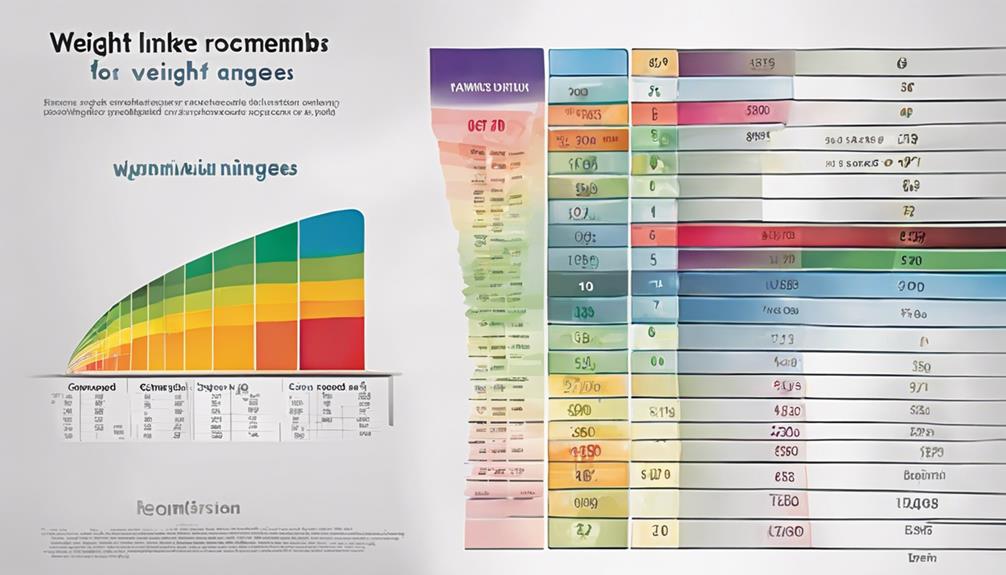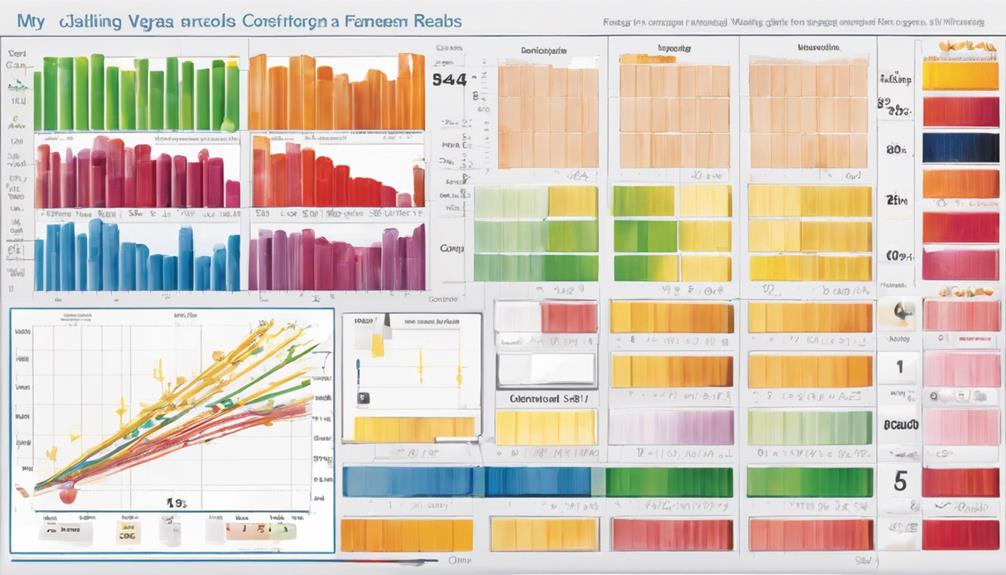Starting the journey of formula feeding is like beginning a road trip with a GPS on hand—except here, the end goal is to make sure your baby is getting the right nourishment.
Imagine having a dependable guide, a Formula Feeding Chart by Weight, that directs you in the right direction with precision. As parents, we're all too familiar with the labyrinth of infant feeding.
But what if I told you there's a complete tool that not only simplifies the journey but also guarantees you're on the right track, feeding your little one just what they need based on their weight?
Key Takeaways
- Feeding guidelines recommend 2.5 ounces of formula per pound of body weight daily.
- Adjust feeding amounts as baby grows to ensure proper nutrition and growth.
- Monitoring weight gain and wet diapers is essential for healthy development.
- Consult pediatrician for personalized guidance on formula feeding based on weight.
Importance of Feeding by Weight
Understanding the importance of feeding by weight is crucial for ensuring the best nutrition and growth for your newborn. By monitoring your baby's weight and adjusting the formula intake accordingly, you can prevent issues such as underfeeding or overfeeding. Feeding guidelines based on weight help determine the right amount of formula needed each day, promoting healthy weight gain and development.
When it comes to feeding your baby, the amount consumed plays a significant role in their growth and overall well-being. Overfeeding can lead to excessive weight gain, while underfeeding may result in inadequate nutrition and slower growth. Regularly monitoring your baby's weight allows you to make necessary adjustments to their feeding routine, ensuring they're receiving the proper amount of nutrition to support their development.
Formula Feeding Recommendations by Weight

To guarantee prime nutrition and growth for your newborn, it is important to follow formula feeding recommendations based on their weight. Babies typically need about 2.5 ounces of formula per pound of body weight daily for adequate nutrition. As per the formula feeding chart, adjusting feeding amounts is vital as the baby grows to meet their increasing needs. For instance, a 10-pound baby would require around 25 ounces of formula per day following this guideline. Monitoring weight gain and wet diapers is essential to make certain that babies are receiving the appropriate amount of formula based on their weight. Consulting a pediatrician for personalized guidance on formula feeding according to the baby's weight is paramount for prime growth and development.
| Baby's Weight (pounds) | Daily Formula Amount (ounces) |
|---|---|
| 5 | 12.5 |
| 8 | 20 |
| 10 | 25 |
| 12 | 30 |
| 15 | 37.5 |
Understanding Feeding Amounts by Weight
When considering a baby's nutritional needs, it's essential to calculate the appropriate amount of formula based on their weight to guarantee ideal growth and development. The American Academy of Pediatrics suggests a general rule of around 2.5 ounces of formula per pound of body weight every 24 hours.
For instance, a 10-pound baby may require approximately 25 ounces of formula daily. This formula feeding chart based on weight is a valuable tool for parents to monitor and adjust feeding amounts as their baby progresses through different baby schedules.
Ensuring that infants receive the right amount of formula per pound helps them stay on a healthy growth curve. Watching for signs that they're getting enough formula is vital for parents in their digital parenting journey.
As babies grow and approach the shift to cow's milk, empowering parents with knowledge about feeding amounts based on weight is key for their child's well-being and development, as recommended by respected health organizations.
Adjusting Formula Intake Based on Weight

Adjusting the amount of formula a baby consumes based on their weight is important for ensuring ideal nutrition and healthy growth. Babies typically need about 2.5 ounces of formula per pound of body weight daily. For instance, a 10-pound baby may require roughly 25 ounces of formula in a 24-hour period.
Monitoring weight gain is essential as it helps in adjusting formula amounts accordingly to support healthy development. Consulting with a healthcare provider can offer personalized guidance on formula intake based on the baby's weight. This professional advice guarantees that the baby is receiving adequate nutrition tailored to their specific needs.
Monitoring Growth and Formula Feeding
Monitoring a baby's growth involves tracking weight gain, developmental milestones, and making sure they receive the appropriate amount of formula for their weight. Regularly measuring and recording your baby's weight, length, and head circumference is important to assess their growth patterns accurately. By comparing these measurements to standard values on growth charts, you can guarantee your baby is developing as expected. In case of any concerns such as slow weight gain or excessive weight gain, consulting a pediatrician promptly is essential for proper intervention.
| Growth Tracking | Length Measurement | Head Circumference |
|---|---|---|
| Record weight weekly | Measure length monthly | Track head circumference bi-monthly |
| Compare to growth charts | Ensure proper growth trajectory | Monitor head growth for brain development |
| Look for consistent patterns | Seek advice if growth deviates | Discuss any concerns with pediatrician |
Frequently Asked Questions
How Do I Calculate How Much Formula My Baby Needs Based on Weight?
We calculate how much formula a baby needs based on weight by multiplying the baby's weight in pounds by 2.5 ounces, offering a rough estimate for daily intake. Adjust based on appetite and monitor to guarantee proper nutrition.
How Much Formula Should I Give My Baby Based on Weight?
We base formula amounts on your baby's weight. Generally, it's about 2.5 ounces per pound daily. For instance, a 10-pound baby might need around 25 ounces daily. Adjust based on hunger cues and growth patterns for proper nutrition.
How Many Ounces of Formula Should a Baby Eat Chart?
We calculate the ounces of formula a baby should eat using a guideline of 2.5 ounces per pound of body weight each day. For example, a 10-pound baby typically needs around 25 ounces over 24 hours.
How Many Ounces of Formula Based on Weight?
We typically recommend offering 2.5 ounces of formula per pound of body weight every day for babies. This guideline helps estimate a baby's formula needs. Adjustments may be necessary based on the baby's appetite, growth, and pediatrician advice.
Conclusion
After examining the formula feeding chart by weight, it's evident that a baby's weight plays an important role in determining the appropriate amount of formula to feed. By following the recommendations outlined in the chart, parents can guarantee their baby receives the necessary nutrition for healthy growth and development.
Monitoring weight, adjusting intake accordingly, and observing growth patterns are essential practices in promoting a baby's well-being through formula feeding. Remember, a well-fed baby is a happy and thriving baby.









